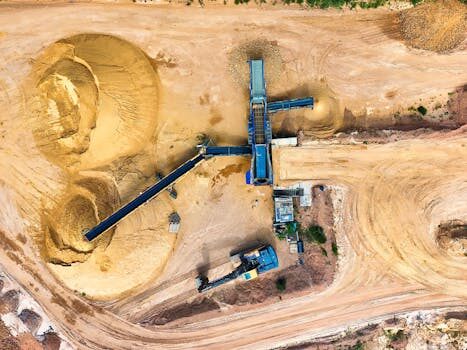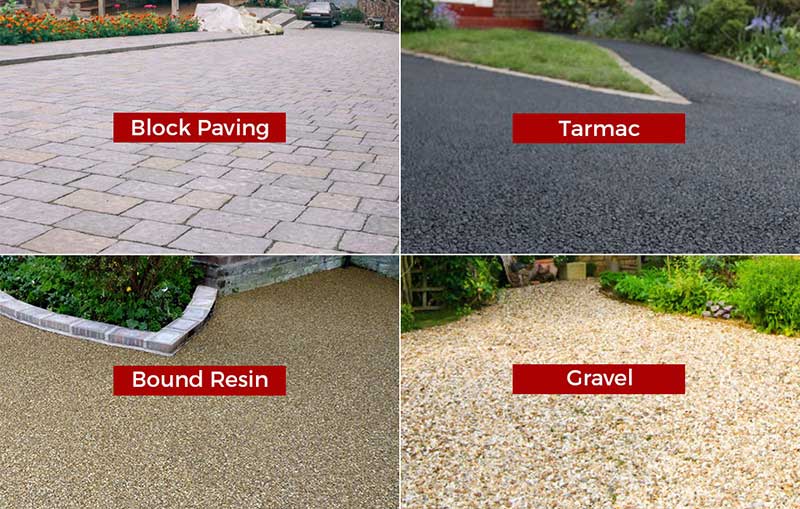Selecting the right driveway material is a decision that requires careful consideration. Each option offers a unique set of benefits and drawbacks that can affect not only the appearance of your home but also its functionality and maintenance needs.
Understanding the types of driveway materials and their pros and cons is crucial for homeowners who want to make an informed decision. Landscaping experts weigh in on this subject to help guide you through the process.
What are the different types of driveway materials?
When it comes to driveways, homeowners have a variety of materials to choose from. Each material comes with its own set of characteristics that can impact the overall look and functionality of the driveway.
Concrete, asphalt, gravel, block paving, and cobblestone are among the most popular choices. But there are also other eco-friendly options and design ideas to consider based on the specific needs of your property.
Durability, maintenance requirements, and aesthetic appeal are just a few factors that will influence your decision. Let’s explore these materials in more detail, highlighting the pros and cons of different driveway materials for homeowners.
What are the pros and cons of concrete driveways?
Concrete is one of the most popular driveway materials due to its durability and cost-effectiveness. It’s a great long-term investment for any homeowner. However, it does come with some disadvantages.

- Durability: Concrete is known for its strength and can last for many years with proper care.
- Maintenance: It requires minimal upkeep but can be susceptible to cracking and staining.
- Cost: While generally more affordable than other high-end materials, the initial installation cost can be higher than other options like gravel.
- Aesthetic: It offers a clean, consistent look and can be stamped or colored for additional style.
Considering these aspects will help you determine if concrete is the best driveway material for long-term durability in your case.
How do asphalt driveways compare to other materials?
Asphalt is another common choice for driveways, often favored for its lower initial cost and dark, sleek appearance.
While asphalt is budget-friendly and quick to install, it does have a shorter lifespan than concrete and requires more frequent sealing. The dark color of asphalt can help to melt snow faster in cold climates, but it can also become soft in extreme heat. Maintenance-wise, it’s essential to seal asphalt every few years to prevent cracks and prolong its life.
Comparing driveway materials based on maintenance needs, asphalt may demand more attention over time but can still be a cost-effective solution for many homeowners.
What is the best driveway material for drainage?
Proper drainage is critical for any driveway to prevent water damage and maintain structural integrity. Here are some materials to consider:
Gravel is often recommended for drainage due to its permeability. Water can easily pass through the gravel into the ground, reducing the risk of pooling and flooding. Block paving and certain eco-friendly options also allow for good drainage when installed with proper base materials and design. On the other hand, concrete and asphalt can present challenges if not designed with adequate drainage solutions.

Choosing the best driveway material for drainage will depend on your specific landscape and climate.
How long do different driveway materials last?
The lifespan of a driveway material is an important consideration, as it impacts long-term costs and maintenance. Here’s a brief overview:
- Concrete: With proper care, can last 30 years or more.
- Asphalt: Typically lasts 20 years, but this can vary with climate and usage.
- Gravel: While it may shift and require top-ups, it can last indefinitely with regular maintenance.
- Block paving: Can last 20-30 years with good installation and upkeep.
- Cobblestone: Known for its longevity, can last 100 years or more.
When evaluating the durability of driveway materials, it’s clear that some options may be more suitable than others based on the expected longevity.
What are the most cost-effective driveway options?
For those on a budget, affordable options for driveway materials are available.
 Black bottom pools are the divisive new backyard trend you need to know about
Black bottom pools are the divisive new backyard trend you need to know aboutGravel is typically the cheapest to install, though it may require more frequent maintenance. Asphalt is another cost-effective option, especially for larger driveways, due to its quick installation and lower material costs. If you’re looking for a balance between upfront costs and long-term value, concrete can be a wise choice due to its durability and low maintenance needs.
Considering both the initial installation costs and the long-term maintenance expenses is key when determining the most cost-effective driveway for your home.

What factors should be considered when choosing a driveway material?
Several factors should influence your choice of driveway material.
- Climate: Some materials are better suited to certain climates than others.
- Budget: Cost considerations include both initial installation and ongoing maintenance.
- Aesthetics: The material should complement the style of your home and landscape.
- Maintenance: Think about the time and effort you’re willing to invest in upkeep.
- Longevity: Consider how often you’re willing to repair or replace your driveway.
By taking into account these considerations, you’ll be better equipped to choose a material that meets your specific needs.
Preguntas relacionadas sobre driveway materials
What is the best material to use for driveways?
The “best” material varies based on individual needs. Concrete offers durability and low maintenance, while asphalt is cost-effective and has a quick installation process. Gravel is affordable and provides excellent drainage. Ultimately, the choice depends on a balance of factors including cost, climate, maintenance, and aesthetics.
Experts suggest assessing your priorities and consulting with a professional to determine the most suitable option for your driveway.
What is the best type of driveway to have?
The best type of driveway aligns with your personal preferences, budget, and practical requirements. Aesthetically pleasing materials like cobblestone or block paving may appeal to those valuing curb appeal, while concrete and asphalt are strong contenders for those prioritizing longevity and cost-effectiveness.
Determine your top priorities and choose a type that addresses those needs effectively.

What is the most low maintenance driveway?
Concrete driveways typically require the least amount of maintenance. They don’t need regular resurfacing or replenishment like asphalt or gravel might. However, they still need to be sealed occasionally to prevent stains and minor cracks.
Low maintenance doesn’t necessarily mean no maintenance, so factor in the occasional upkeep even with a concrete driveway.
What driveway material lasts the longest?
Cobblestone driveways are renowned for their longevity, often lasting over a century with proper care. They are followed closely by well-maintained concrete driveways, which can last several decades.
Durability often comes at a cost, so weigh the initial investment against the long-term benefits when choosing a material based on its lifespan.
To provide more insight into the practical application of these materials, let’s include a video that showcases the installation process of permeable block paving, an environmentally friendly option with excellent drainage.

In conclusion, when selecting driveway materials, it’s essential to consider not only the initial cost and aesthetic appeal but also the long-term durability and maintenance needs. Each material has its advantages and drawbacks, and the right choice will depend on a variety of personalized factors. Whether you value style, sustainability, or sturdiness, there is a driveway material out there that will meet your needs and enhance the beauty and functionality of your home.
 Best foliage plants for your garden: year-round appeal
Best foliage plants for your garden: year-round appeal
